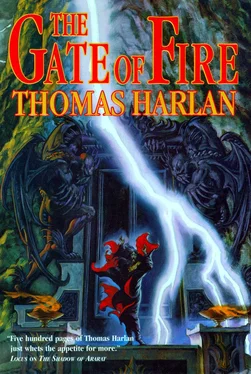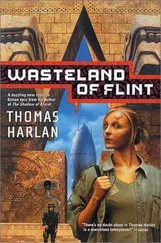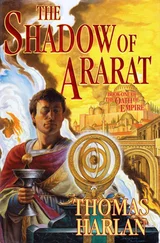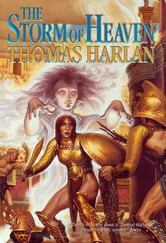Thomas Harlan - The Gate of fire
Здесь есть возможность читать онлайн «Thomas Harlan - The Gate of fire» весь текст электронной книги совершенно бесплатно (целиком полную версию без сокращений). В некоторых случаях можно слушать аудио, скачать через торрент в формате fb2 и присутствует краткое содержание. Жанр: Фэнтези, на английском языке. Описание произведения, (предисловие) а так же отзывы посетителей доступны на портале библиотеки ЛибКат.
- Название:The Gate of fire
- Автор:
- Жанр:
- Год:неизвестен
- ISBN:нет данных
- Рейтинг книги:4 / 5. Голосов: 1
-
Избранное:Добавить в избранное
- Отзывы:
-
Ваша оценка:
- 80
- 1
- 2
- 3
- 4
- 5
The Gate of fire: краткое содержание, описание и аннотация
Предлагаем к чтению аннотацию, описание, краткое содержание или предисловие (зависит от того, что написал сам автор книги «The Gate of fire»). Если вы не нашли необходимую информацию о книге — напишите в комментариях, мы постараемся отыскать её.
The Gate of fire — читать онлайн бесплатно полную книгу (весь текст) целиком
Ниже представлен текст книги, разбитый по страницам. Система сохранения места последней прочитанной страницы, позволяет с удобством читать онлайн бесплатно книгу «The Gate of fire», без необходимости каждый раз заново искать на чём Вы остановились. Поставьте закладку, и сможете в любой момент перейти на страницу, на которой закончили чтение.
Интервал:
Закладка:
There was a scrabbling sound on the rocks below her, and she leaned out, seeing that the old man had finally made his way up to the base of this little cliff.
"Wait," she called down, beginning to uncoil a rope from around her slim waist. "I'll make an anchor."
"Good!" floated back the reply. The old man sat down on a stone at the base of the waterfall, wiping his brow with an ancient and foully stained cloth. His desert robes had suffered, too, in the climb up out of the canyon bottom. He had preferred to wear the full kaffiyeh and robes and camel-boots that were the garb of the desert tribes. He and Zoe had argued, in the early morning shadows, under the ruin of the Damascus gate. She had chosen to wear a light cotton kilt and tunic, her legion boots, and her gear slung on leather belts around her waist and over her shoulder. He felt it was unseemly to go into the hills in such a state. She had overruled him.
Now he panted in the heat, below, while she felt fried like a griddle cake in a pan, above.
"What do you see?" the old man shouted.
"The two stones," she called back, "and a hidden place between them."
She thumbed the waxed plug out of one of her waterskins and took a long drink from it. The water had been cold when she had filled them from the cistern under the city, but now it was lukewarm and smelled faintly of sheep. Odenathus had urged her to take one of the copper Legion canteens with her, but it was heavier than this with all that weight of metal. Her cousin had barely marked her going-he and his mother were locked in one of their endless arguments about how to rebuild the city.
Zoe did not care. The city was dead to her. They could clear the debris from the cisterns and open the streets again, even restore the Temple of the Four Gods, or the plinth of Bel, but it would not bring back the bright, glorious city of her youth. That was dead. This dark man, this Lord of the Ten Serpents, had smashed it down in the wake of Rome's betrayal.
The young woman snarled unconsciously, her narrow, elegant face transformed by pure unadulterated hatred. Rome will pay, she vowed in her heart, Pay for each murder they committed. Pay for each child's skull that lines the city streets. Then I will find this dark man, and he, too, will pay…
Weeks of unceasing labor had not even recovered all of the bodies from the ruin of the city. Even burying them in a series of mass graves would be fruitless. The sand would cover the city soon enough, and bury everything.
Zoe stood, brushing dust and grit from her bare legs. She bent down and picked up the waterskin, tying it back to her leather harness. There was something barely visible in the deep shadow under the two monoliths; some edge of worked stone. It bore investigation.
– |"All together, now, heave!" Odenathus, stripped to the waist, his muscular frame glistening with sweat, put his shoulder into the pulley rope. Around him, a dozen men did the same, pulling with all their might. Others crowded around the sides of the obelisk, hands on guide ropes. Once it had stood in the square that backed onto the theater and the edge of the spring. Now it had fallen, its base cracked open by the Persians with chisels and wooden splitting stakes, and lay across the old stairway that led down into the cisterns. "Heave!"
The ropes pulled tight, and Odenathus and his men dug in, pulling with all their might. Slowly the obelisk began to turn, and the men beside it were quick to slide rollers hewn from the few unburned logs found in the city underneath the massive sandstone cylinder. The obelisk groaned and threatened to roll back, but others had jammed stakes in behind it.
"Heave!"
The cylinder turned over, slow and ponderous, but it caught on the rollers and suddenly jumped ahead. Men scattered in all directions, and Odenathus felt the rope over his shoulder go slack. He turned, eyes wide. The pillar was rolling toward him, a massive, suddenly mobile block of stone weighing a dozen tons. Scattered bricks and broken statuary shattered to pale dust under it. Odenathus leapt aside, his blood afire with shock, and threw himself into a side street. The cylinder bounced past and slammed into the side of a half-burned storefront. The facing of the building collapsed with a loud boom and showered the street with dust and fragments of travertine facing and ground brick.
Odenathus rolled up, coughing in the thick haze of rock dust, and looked around. "Anyone hurt? Hello?"
The others called back, their voices harsh with grit. Everyone seemed to have survived.
"Well," a querulous voice came from behind him, "you seem to have cleared the stairwell."
Odenathus made a half smile-half grimace and stood up, brushing debris from his pantaloons. He had added a fine new scrape and a thin cut along his arm to the pale scars that already ornamented his chest. "That we did, mater. How go things in the kitchens?"
"Poorly," his mother said, taking him by the arm. She led him a little bit away, where the workers marveling at the destruction caused by the runaway obelisk could not hear her. Her old face, tired and framed by white curls, was solemn. He looked away from her blind eyes, unable to bear the sight.
"We're fast running out of food, my son. There just isn't enough left in the stores we've excavated to feed everyone for more than a few weeks. The gardens outside the city were all stripped bare by the Persians, and no caravans will come soon. Every merchant from Edessa to Aelana knows that the city has been destroyed."
Odenathus frowned, considering the options. They did not seem good. He wanted, in his heart, to start anew here-to raise up a whole new city from the ashes of the old-but so many things stood against them. The matter of water was almost resolved. During the siege Persian engineers had cut the aqueducts that ran into the city from the hills in the west, but those catchments had been added to support a city of fifty thousand people. Now there were perhaps six hundred in the city. A few more arrived each week, travelers who had been away during the siege, or expatriates who had forced themselves to return one last time to their homes. In the beginning, he knew, the city had risen from less-no more than a wandering band of desert tribesmen had laid the first stone-but they had flocks of sheep and goats and camels and were used to living on very little.
He looked around; seeing the scarred faces of the men at his command, the thin, pinched look on the few children who were watching the business of the day from the shoulders of a nearby colossus, now fallen into the street with every other statue or idol in the city. These people were born and bred to live in a modern Roman city, with running water and a market and specialized crafts that allowed one man to purchase bread from another. All of those things were gone. If they were to remain, they would have to become nomads again, if only to gather the food they needed to live.
"Do we have any money?"
Ara laughed, putting a wizened hand to her mouth. "Oh, my son, we have plenty of good red gold. The Persians were in haste when they left, and more than one hoard of coin was left unmolested. Our own fortune, that won by your father with his caravans and ships and kegs of spices, is untouched. If there was anyone to buy from, we could buy aplenty. But no one comes here anymore-all that is dead and gone now."
"We could," he said in his stubborn way, "send a party to Damascus to buy food, livestock, tools. All the things we need here. It will be very difficult, but we can remain. The city will rise again, bit by bit."
Ara took her son's face in her hands, her fingers light, feeling the noble nose and the high cheekbones. She felt the close-cropped shape of his hair and the firm muscle along his jaw.
"In this darkness," she said, her voice sad, "you sound so much like your father. If you will it, all these people of the city will remain, but it will be very hard for them. It will be harder for the children; so many of them cannot sleep even now, thinking that the dark one will return. This place is haunted, my son, but perhaps you can make it live again."
Читать дальшеИнтервал:
Закладка:
Похожие книги на «The Gate of fire»
Представляем Вашему вниманию похожие книги на «The Gate of fire» списком для выбора. Мы отобрали схожую по названию и смыслу литературу в надежде предоставить читателям больше вариантов отыскать новые, интересные, ещё непрочитанные произведения.
Обсуждение, отзывы о книге «The Gate of fire» и просто собственные мнения читателей. Оставьте ваши комментарии, напишите, что Вы думаете о произведении, его смысле или главных героях. Укажите что конкретно понравилось, а что нет, и почему Вы так считаете.











